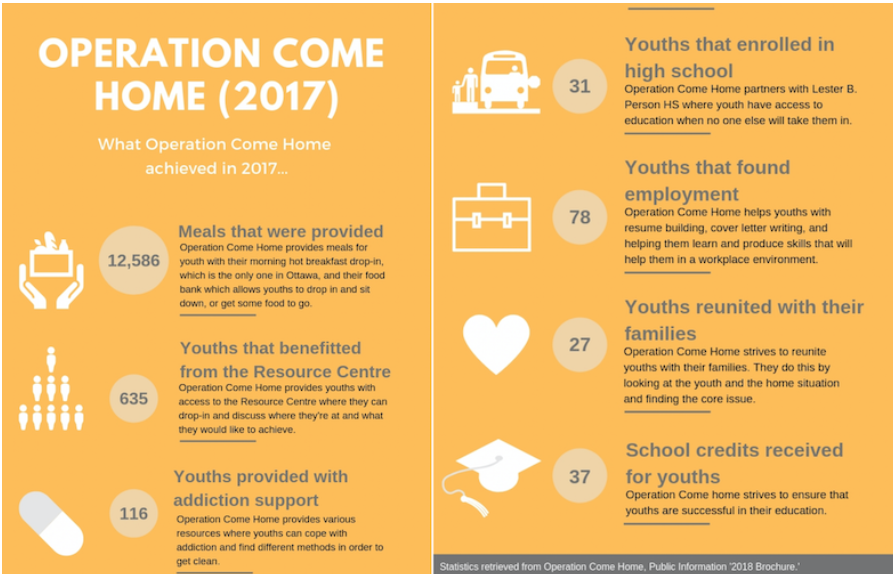Local Ottawa Organization Helps Homeless Youth
Ottawa’s homeless youth continues to be marginalized in the community. There are few services that provide shelters and drop-in services for the youth demographic.
Out of the drop-ins available, most of them are not open all day, and especially not over night.
Due to the under-representation in the community, youth often do not know where they are headed next, and this leaves them with a sense of isolation and disconnect from the community.
According to the Canadian Observatory on Homelessness, the definition of “homeless” is “the situation of an individual, family or community without stable, safe, permanent, appropriate housing, or the immediate prospect means and ability of acquiring it.”
The lack of aid for youths needs to be brought to the attention of most and Operation Come Home is one of the few services in Ottawa that provides this kind of care for homeless youth.
Operation Come Home offers multiple programs to accommodate youth, ages 16 to 27, struggling with different areas of their life.
Through aiding youth with these programs, they can prevent them from staying homeless in the future.
Corey Illingworth, 26, educational assistant with the Ottawa-Carleton District School Board, became homeless in March 2011, when he was 19.
He got involved with Operation Come in February 2011, initially using their drop-in program. They helped him find work through their Bottle Works program and get into the child and youth care program at Algonquin College.
The drop-in centre at Operation Come Home is open on weekdays from 8a.m. to 11:30a.m., where youth may come in for a warm meal, making it the only morning youth drop-in centre in the city, according to Eric Bollman, the communications director at Operation Come Home.
Illingworth says, “I think the most amazing thing is their drop-in service, just the social aspect of that; going into a space where you know you’re not the odd one out.”
Operation Come Home helps youth by helping them find a stable home in order to become clean, healthy, and find a job.
Bollman says that by providing a stable home, an individual is able to combat the other issues in their lives, such as addiction.
Ellie Watts, 23, was not a homeless youth, but used Operation Come Home to become stable in her mental health and find a job where she felt a strong sense of community.
“I went through a really rough time. I was really depressed and started harming myself. Neither of my parents even knew what I was going through, even though I was in the same house as them everyday,” Watts said.
She says Operation Come Home allowed her to gain further work experience, as well as overcome her anxiety.
https://soundcloud.com/user-354034968/ellie-watts
Bollman says Operation Come Home is “a place where people can get together with shared experiences.”
It provides a safe place for youth to hangout, Bollman says, emphasizing the safeness of the organization. “[We] want them to become a part of a larger community.”

“It all starts with mental health,” says Bollman.
According to Ottawa’s 10 Year Housing & Homelessness Plan, the amount of youth at overnight shelters in Ottawa from 2014 to 2017 declined from 379 people to 255 people.
It also shows that men who utilized shelters, were 3,041 people in 2014 and 3,224 in 2017.
“The fact that that’s available in comparison to the adult shelters where there’s almost this sense of fear just staying there. It’s a little more comforting, especially as a young adult,” says Illingworth after he was referred to the Young Men’s Emergency Shelter.
These numbers show that less youth stay in shelters, indicating their uncomfortableness towards staying in shelters with older people.
Currently in Canada, there are not many studies dedicated to student homelessness.
Eric Weissman, a professor at the university of New Brunswick Saint John campus is dedicated to researching student homelessness.
He says that homelessness is not defined simply by a life on the streets, but can also refer to people who do not have a stable home and are forced to move in and out of precarious housing.
The experiences of Weissman are what inspired his research on student homelessness, as he struggled with addiction and homelessness, causing him to leave school at the University of Toronto.
“For many years, I never thought of myself as homeless. I knew I was an addict, I didn’t really consider couch surfing as homelessness, but it really is,” he said.
